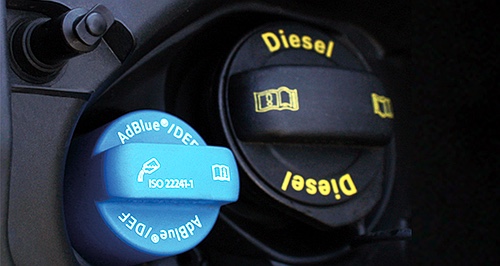News - General News - EmissionsWithout AdBlue Australia stopsUrea not here: The National Road Transport Association says AdBlue shortages are fuelled by China closing its exports of refined urea. Chinese export ban fuels global diesel exhaust fluid shortage6 Dec 2021 By MATT BROGAN AUSTRALIA’S agriculture, mining and transport industries are facing a potential crisis as a global exhaust fluid shortage threatens to bring the nation’s diesel engines to a halt.
Commonly known by its trade name, AdBlue, the anti-pollution additive used in modern diesel engines (Euro4 onwards) is the subject of an international shortage the National Road Transport Association says is fuelled by China closing its exports of refined urea.
The colourless and odourless product is the active ingredient in AdBlue and its contemporaries and contains high levels of ammonia which are combined with deionised water to neutralise NOx matter in diesel exhaust before it enters the atmosphere.
Urea is also the primary component used in many popular fertilisers, as well as resins used to manufacture plastics, nitrate used to manufacture explosives, and the base ingredient of a wide range of beauty, pharmaceutical and medical products.
Also found in many diesel-powered passenger, SUV and LCV models, the AdBlue system ensures vehicles comply with national emissions standards.
The NRTA is urging the federal government to secure an alternate supply of the fluid saying national supply chains will be “first and hardest hit” by the looming AdBlue shortage.
“We will be making sure that the Transport Minister, Deputy Prime Minister Barnaby Joyce, is briefed on the potential impact of the national supply chain and on our members,” NRTA CEO Warren Clark said.
“Our industry isn’t the only one that will be affected, but we will be hit first and hardest. There are issues that go beyond NatRoad and the trucking industry.
“We are calling on the Government to convene a task force of industry groups to look at options to mitigate the situation in the immediate term. It is time for leaders – industry, government, supply chain and major consumers – to work together to manage the challenges,” he added.
Mr Clark said the potential impacts of the AdBlue shortage on Australian consumers could further exacerbate supply chain disruptions caused by the ongoing effects of the COVID-19 pandemic.
He said shipping delays of products – including vehicles – into and around Australia could be reduced to a trickle by as early as February next year.
“If we learned one thing from COVID-19 it’s that a lack of co-ordination only compounds problems,” Mr Clark continued.
“While those issues reflected different health rules in different jurisdictions, the ball is squarely in the Federal Government’s court in terms of finding an alternate source.”
Mr Clark said the reasons behind the supply shortage of refined urea from China is not immediately clear, but that the nation’s protection of fertiliser supply for domestic use is likely behind the decision to “switch off” diesel exhaust fluid exports.
“We’ve heard things like the cost of fertiliser in China has internally gone up dramatically, and a large portion of that is urea. So, what they’ve said, is that they do not want to export any urea to try and keep the price of local fertiliser down,” he explained.
“It may (also) be that there’s some sort of trade issue that they’ve got with other countries around the world.”
Beyond the obvious ramifications likely to be felt within the trucking and transport industry, Mr Clark said the price of consumer goods – including food – will also be affected as freight companies pass on the costs of doing business.
Power generation and even ambulance and future firefighting efforts may also be affected by the shortage of AdBlue with most metropolitan and regional emergency service vehicles reliant on diesel exhaust fluid to operate.
Mr Clark said the price of AdBlue has risen by between five and ten cents per litre over the last week, adding significantly to the fuel bill of Australia’s largest supply chain distributors.
“It’s not just Australia that’s being impacted by this… the whole world is going to be impacted by the lack of this AdBlue chemical,” Mr Clark warned.
“This could be a very big issue for the whole country… a large portion of modern diesels rely on AdBlue to operate.
“We’re talking about trucks, tractors, harvesters, agriculture; we’re talking about power generation in South Australia; we’re talking about the whole country is going to be impacted if we don’t solve this lack of supply.
“We believe that there’s enough supply of it until about February next year. If this is not solved by then, then we have a major problem,” he added.
It’s understood Australian Trucking Association chief of staff Bill McKinley is meeting with the Transport Minister, Deputy Prime Minister Barnaby Joyce, and the Minister for Industry, Energy and Emissions Reduction, Angus Taylor, to try and broker a solution.
The ATA and its member associations collectively represent 50,000 businesses and over 200,000 people in the Australia trucking industry. It says the following approaches must be adopted if the effects of diesel exhaust fluid shortages are to be mitigated:
"Australia should ban urea exports, except on a government-to-government basis (a strategy already implemented by South Korea).
"The Department of Foreign Affairs and Trade (DFAT) should prove support to Australian diesel exhaust fluid (DEF) suppliers in their efforts to source urea, including from China.
"The Department of Infrastructure, Transport, Regional Development and Communications (DITDRDC); the National Heavy Vehicle Regulator (NHVR); and the Department of Agriculture, Water and the Environment (DAWE) should work with OEMs to determine if it is technically possible to remap engines to reduce their DEF consumption or, alternatively, to see if it is possible to vary the DEF standard to allow for a modest proportion of fertiliser grade urea can be used in its production.
"DITRDC and the Department of Industry, Science and Energy Resources (DISER) should consider a rationing plan for Australia (a strategy again already implemented by South Korea).
"DITRDC, NHVR and state road agencies should consider what emergency permits could be issued to allow for the increased use of high productivity vehicles if there is a DEF shortage."  |
Click to shareGeneral News articlesResearch General News Motor industry news |














Facebook Twitter Instagram